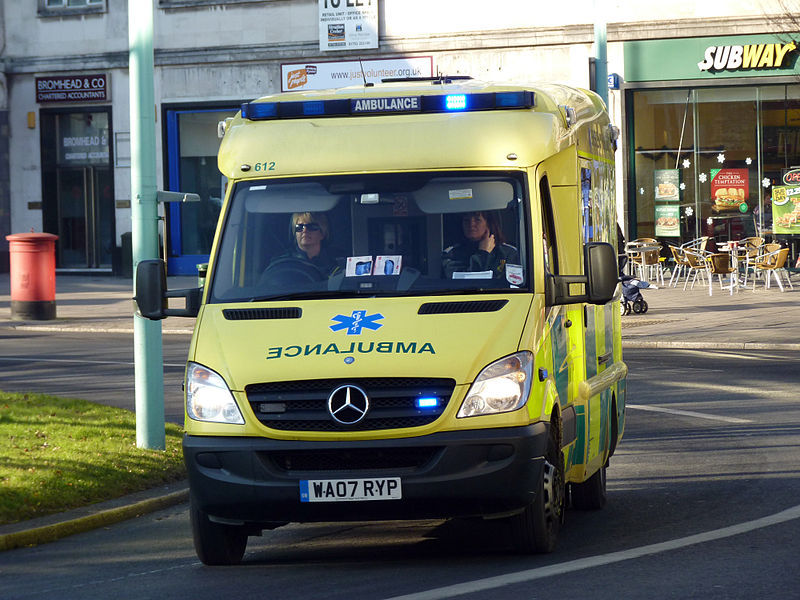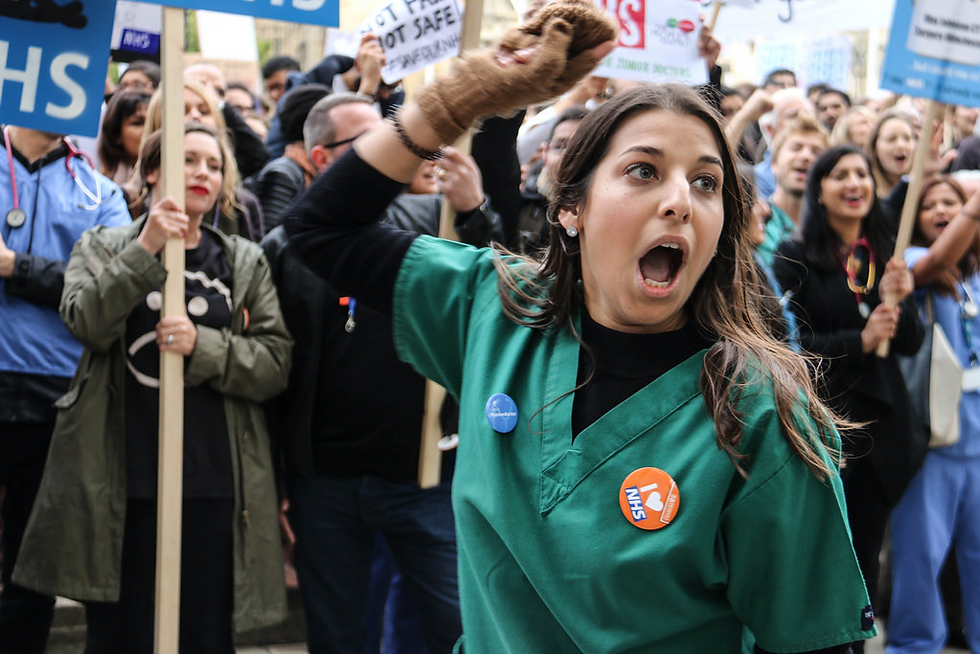The NHS At 70
- The CLV Phoenix
- Jul 5, 2018
- 6 min read
By Ben Mills
An ageing population and changing health demands are causing a crisis for the organisation. What does the future hold for the NHS?
For seventy years our National Health Service has been admired the world over for its revolutionary approach to healthcare, providing world-class treatment free of charge when needed, thanks to funding from the taxpayer. But now, an ageing population and changing health demands are causing a crisis for the organisation. What does the future hold for the NHS, and what must be done to save it?
When, on 5th July 1948, the new National Health Service was launched, health minister Aneurin Bevan set out its three core principles. He said that the services it was to provide would be free at the point of delivery, that access to these services should be equal to all and not based on wealth and that the NHS met the needs of everyone. Largely, the organisation has stuck by these principles and to this day still fulfills its aim to provide healthcare without discrimination between the equality of care received by the rich and the poor. Indeed, it is a privilege many across the globe are not lucky enough to have; the disparity in healthcare as a result of wealth is one of the deepest and most unjust forms of inequality in the world today, even seen elsewhere in the supposedly developed, western world.
But does the NHS still manage to meet the needs of everyone? Recent data shows that perhaps this is not the case, for both its patients and its staff.
The NHS has high targets for its emergency, cancer and planned operation care, and so it should - such procedures and facilities are vital to save lives. However, the majority of trusts in England are not meeting them. Patients are having to wait longer and longer to be seen in A&E departments or receive operations and cancer treatment, across the country, thanks to increased strain and pressure on these services.
Government targets mean 95% of patients at A&E must be discharged or referred to a different department for treatment 4 hours after arrival. This, however is not the case, as in England this goal has not been met, on average, since July 2015. Currently, the actual figures (for May 2018) stand somewhere around 90.4%. Over 150,000 patients were also forced to wait 30 minutes in emergency departments to be seen to last winter, according to NHS statistics. Statistics in other areas are just as, if not more, abysmal; the average percentage of patients beginning cancer treatment 62 days after GP is 82% (again, below target), and only 87.5% of patients have to wait 18 weeks or less for an operation, well below the 92% target.
Patient satisfaction with NHS services are also down. On a 0 - 100 scale, where 100 is that services are fully accessible, patient’s scores on access to/waiting times for A&E average 65.1. It is clear that although currently the NHS’ situation isn’t too bleak, there is the potential for it to become dire in the near future. The British Medical Association says itself that the system is at “breaking point”.
Many medical professionals have also spoken out about their experiences of this deteriorating organisation. One doctor in a trust in the north - west of England told the BMA:
“It’s really scary every day. We are frequently in a position of having every cubicle in emergency care full and having a queue of people in the corridor, and they are often very unwell.
“You can’t examine people there, you can’t really see how they are and you spend a lot of time going up and down that queue trying to make observations and speaking to paramedics.
“But you never really know how sick someone might be and what you might miss. There are people I thought would be OK and two hours later you get them into a ward and realise they could have [suffered a cardiac arrest].
“If that was my Nan I would be horrified. And I’m making those decisions. It’s soul-destroying. You’re constantly worrying about what you might miss on the corridor.”
So what exactly is going wrong?
Unfortunately, it’s not that easy to pinpoint one specific factor as the cause of the NHS’ troubles. A lack of funding certainly has a major influence; though not necessarily taking money away from the NHS, an £85 million budget cut to public health announced by the government last year, and other cuts in the past, means that less money spent on raising awareness around hygiene, alcohol, drugs etc. surely has, and will, place more strain on the NHS in treating related illnesses.
But the changing demands of health and social care are also causing massive issues for the organisation. One of the most prominent of these changes is the ageing population of the UK. Our generation will be the first to consistently live past 80, and some estimate that the average life expectancy for babies born in 2030 may well reach 90 or above. Already, as the post - war “baby - boomers” enter their seventies and require additional care and treatment on the NHS, costs are rising and the infrastructure cannot cope; many hospitals are now working at near maximum capacity.
Changes in our lifestyles also provide a great challenge for the health service. Obesity is one of the greatest of these challenges, with over half the population of the UK overweight or obese in 2015, and rates rising at an alarming rate in children and young people in particular. Our modern diets, which are now often dominated by high calorie, fat and sugar foods are meaning there has been an influx of cases in obesity related diseases such as type 2 diabetes and coronary heart disease; it is estimated by Public Health England that treating such preventable conditions, of which diet is the major cause, is costing the NHS around £6.1 billion every year.
And things are only going to get worse from here. As Brexit looms and the future of EU citizens living and working in the UK is uncertain, there is rising concern that it may trigger the departure of 130,000 EU citizens (excluding those from the UK) working in the NHS, which would leave a massive deficit in staff in an organisation already starved of personnel. With around 25% of doctors and other medical professionals trained abroad, the uncertainty around deals regarding free movement of people also puts this sector of the NHS into jeopardy.
It’s not just Brexit which is driving staff away, either. As hospitals become full, many nurses, doctors, paramedics and other frontline staff are stepping away from the profession because the pressure of long hours and dealing with difficult, and often upsetting, conditions for patients is becoming to great. The government has been criticised for its failure to support staff who are facing a “hostile” working environment; assaults on NHS staff rose by 10% last year.
It is very clear that, while we are certainly very lucky to have a system such as the NHS to provide us with healthcare when and where we need it, something must be done before it crumbles and does not provide such security for future generations and, indeed, ourselves. Something must be done to heal our wounded NHS.
There are loose promises to improve the state of the health service, such as the extra injection of funds into the organisation over the next four years announced by the Prime Minister last week. However, this is simply not enough.
Without a serious review of how the NHS will cope with the demands of the next decades, how it will improve conditions for both its patients and its staff, and how it can continue to provide high quality healthcare for all in a changing environment, it seems unlikely that the organisation will be able to stand for another 70 years.
But there is hope for the National Health Service. The hospitals of the North East are a prime example of how the universal healthcare system can adapt to new demands, including greater integration of primary and social care. Trusts in the region are frequently among the highest in the country in terms of how well they meet (and exceed) those targets set around waiting times. Experienced bosses of individual trusts and cooperation with local councils with regards to social care has meant that the NHS in our region can quickly process patients, by guaranteeing they are receiving adequate treatment post leaving the frontline system to ensure their wellbeing.

It is this integration which will be vital to the survival of the organisation in the future. By liaising closer with local authorities and Public Health England, it means pressure on the NHS can be relieved by dealing with issues such as mental health, provision of social care for the elderly which may prevent the worsening of some conditions, or poor lifestyle choices at their stem before they become serious problems left to the NHS to handle. Alternatively, it’s possible that uniting the health and social care provided by all 3 bodies into one, larger NHS may speed up the process of treatment and hence relieve strain on frontline, emergency NHS services; such systems have already proved successful in countries like New Zealand. Of course, major funding boosts will also be required.
Whichever direction senior figures choose to take the NHS in the coming years, it is evident that a major overhaul of the system is imperative to ensure that the organisation is fit to offer the same quality of treatment it has given for the past 70 years four ourselves and future generations for the next 70. If this happens, and is successful, on 5th July 2088 we will hopefully be able to reflect on the continued great successes our National Health Service has been able to achieve.
READ MORE LIKE THIS...
READ MORE BY...






Comments